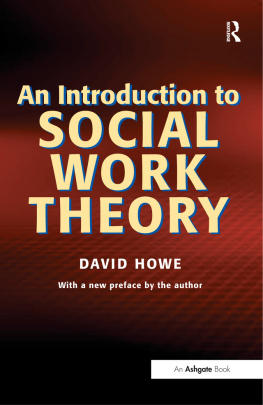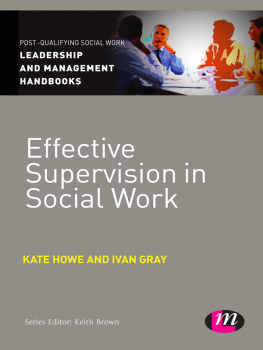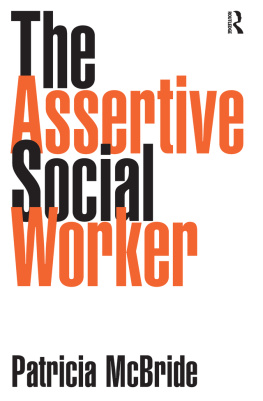The Compleat Social Worker
Also by David Howe
Social Workers and their Practice in Welfare Bureaucracies
An Introduction to Social Work Theory
The Consumers View of Family Therapy
Half a Million Women: Mothers Who Lose Their Children by Adoption (with P. Sawbridge and D. Hinings)
On Being a Client: Understanding the Process of Counselling and Psychotherapy
Attachment Theory for Social Work Practice*
Attachment and Loss in Child and Family Social Work
Adopters on Adoption: Reflections on Parenthood and Children
Patterns of Adoption: Nature, Nurture and Psychosocial Development
Attachment Theory, Child Maltreatment and Family Support* (with M.
Brandon, D. Hinings and G. Schofield)
Adoption. Search and Reunion (with J. Feast)
The Adoption Reunion Handbook (with L. Trinder and J. Feast)
Contact in Adoption and Permanent Care (with E. Neil)
Child Abuse and Neglect: Attachment, Development and Intervention*
The Emotionally Intelligent Social Worker*
A Brief Introduction to Social Work Theory*
Attachment Across the Lifecourse: A Brief Introduction*
Empathy: What It Is and Why It Matters*
* Also published by Palgrave Macmillan
The Compleat Social Worker
David Howe
David Howe 2014
All rights reserved. No reproduction, copy or transmission of this publication may be made without written permission.
No portion of this publication may be reproduced, copied or transmitted save with written permission or in accordance with the provisions of the Copyright, Designs and Patents Act 1988, or under the terms of any licence permitting limited copying issued by the Copyright Licensing Agency, Saffron House, 610 Kirby Street, London EC1N 8TS.
Any person who does any unauthorized act in relation to this publication may be liable to criminal prosecution and civil claims for damages.
The author has asserted his right to be identified as the author of this work in accordance with the Copyright, Designs and Patents Act 1988.
First published 2014 by
PALGRAVE
Palgrave in the UK is an imprint of Macmillan Publishers Limited, registered in England, company number 785998, of 4 Crinan Street, London N1 9XW.
Palgrave Macmillan in the US is a division of St Martins Press LLC, 175 Fifth Avenue, New York, NY 10010.
Palgrave is the global imprint of the above companies and is represented throughout the world.
Palgrave and Macmillan are registered trademarks in the United States, the United Kingdom, Europe and other countries
ISBN 9781137469465
This book is printed on paper suitable for recycling and made from fully managed and sustained forest sources. Logging, pulping and manufacturing processes are expected to conform to the environmental regulations of the country of origin.
Typeset by Cambrian Typesetters, Camberley, Surrey
Printed in China
For Catherine Gray
Contents
Acknowledgements
Catherine Gray has been the publisher for my Palgrave Macmillan books for the last twenty years. I owe her a huge debt of gratitude for two decades of wonderful advice, support and encouragement. So a big thank you, Catherine. Stretching back even further in time, I owe my career in social work, as a practitioner and an academic, to two people in particular. In the late 1960s I was interviewed by Brian Stimpson, Derbys Childrens Officer, for a job as a child care officer. My first degree was in science. After graduating, I spent a couple of years teaching sciences in East London. So, given my provenance, I was surprised, to say the least, when Mr Stimpson offered me the job. During my time working as a child care officer, and a few years later as a social worker, I met many, many remarkable people from whom I learned so much. And then in 1976 I found myself being interviewed again, this time for the post of Lecturer in Social Work at the newly established MA in Social Work degree at the University of East Anglia, Norwich. The interview panel was altogether more intimidating than the cosy affair that was my experience in Derby. It was not until I had arrived back home the next day that I learned Id been successful. Dr Martin Davies, then Director of the new programme, and now Emeritus Professor, phoned to tell me the news. I was thrilled and daunted in equal measure. But Martin proved a great colleague, a stimulating mentor, and a consummate scholar. As both friend and fellow academic, he has taught me so many things over more years than I care to remember about the value of research and the craft of writing. Thank you, Martin. And while were on the subject of writing, many thanks to Nick Brock who has copy-edited this book with great speed, accuracy and sympathy. Thanks, too, for the comments and advice of the three anonymous reviewers of this book. Honestly, I have tried to follow your suggestions whenever and wherever I could, but probably not always to the degree or extent your insights deserved. And when, occasionally, one of you said one thing and another said the opposite, Ive generally stood frozen in the middle and done nothing. However, Im always struck by the wisdom and generosity of social work colleagues who take the time and interest to read and think about each others efforts. Although I am not presuming for one second that my fellow social workers will agree with all that I am saying in this book, nevertheless the idea of the compleat social worker is my way of saying thank you to the profession I have worked in for the last 46 years and which has given me the opportunity to meet so many kind, able and extraordinary people.
David Howe
Norwich
1
The Individual and Society
Looking Both Ways in Social Work
Looking both ways
People, as individuals, take note of what is expected of them by society. They have responsibilities to raise children safely and well, to work if they are healthy and fit, to care for those who are vulnerable and dependent. Most people behave within the law.
People also have rights. They have the right to be treated fairly, to be supported when they are old and ill, to enjoy a basic standard of living. There is therefore a balance to be struck between individual conduct and social living. Valuing the freedom of the individual has to be weighed against the good of the community. Societies dont work unless people are prepared to accept some social duties and obligations.
Society and its agents also take an interest in the individual. Those who break the law will be sought and punished. Those who are troublesome will be identified, assessed and dealt with by the police, the courts, probation officers, child protection agents, mental health specialists. People who are a problem for society therefore become subject to treatment and control.
Those who are troubled will also be of concern to the state and its agents. The troubled might include parents who struggle to raise their children, individuals who suffer mental illness, people who have a learning disability, old people who can no longer care for themselves, and families who get into debt and become homeless. Those who find living in society a problem are likely to become the subject of care and protection, support and guidance, or, again, treatment and change.













